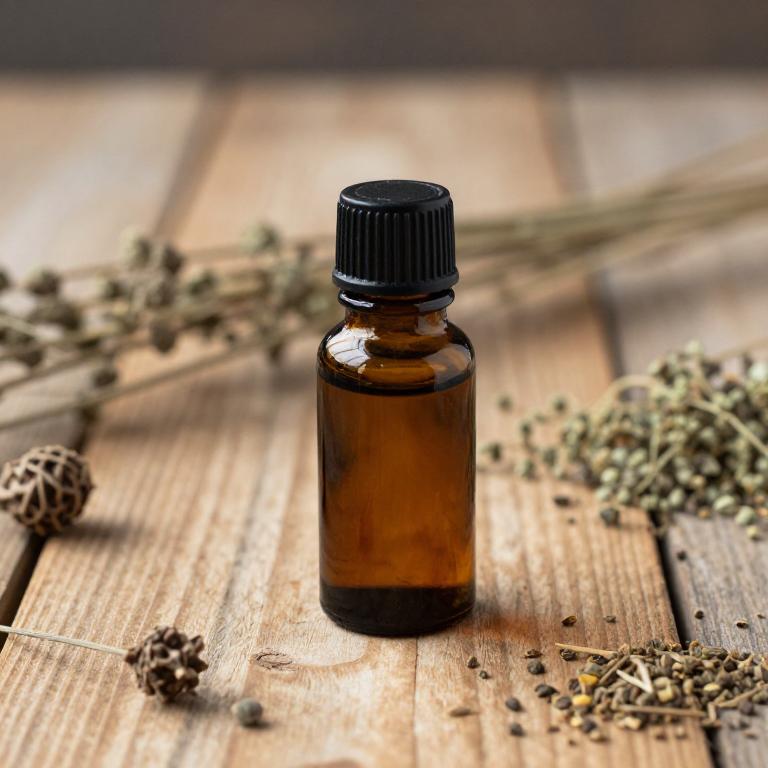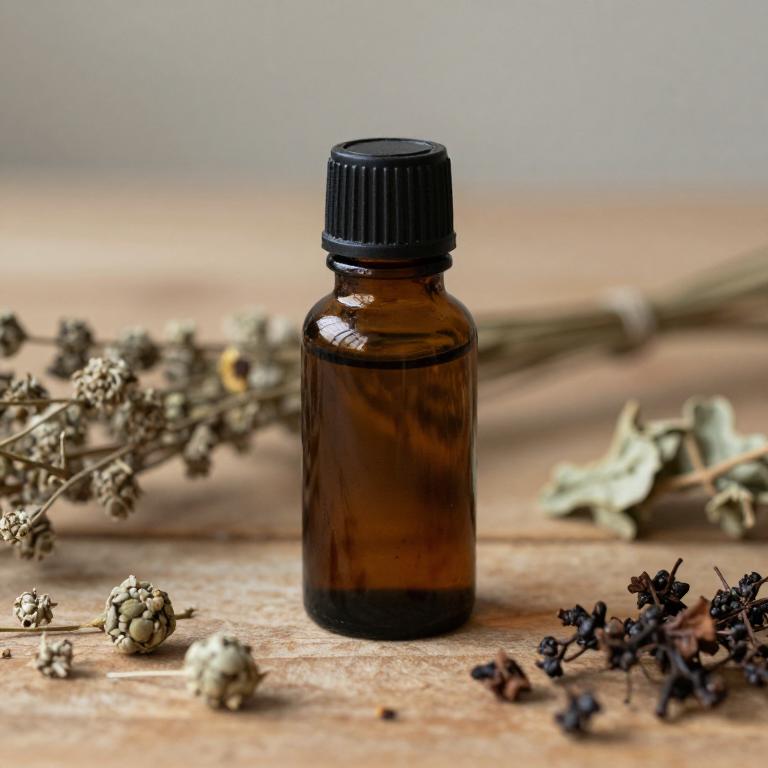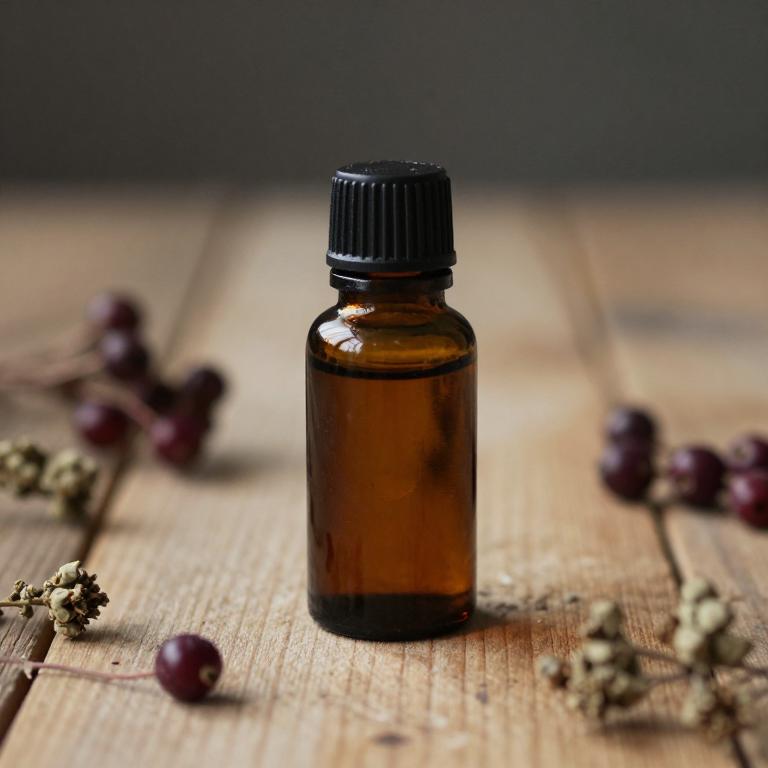10 Best Herbal Essential Oils For Peptic Ulcers

Herbal essential oils have been explored as natural remedies for managing symptoms of peptic ulcers, primarily due to their anti-inflammatory and antimicrobial properties.
Oils such as ginger, clove, and oregano are commonly studied for their ability to reduce stomach acid and protect the gastric lining. These oils may help neutralize harmful bacteria like Helicobacter pylori, a known contributor to ulcer formation. However, while some preliminary research shows promise, more clinical studies are needed to confirm their efficacy and safety.
It is important to consult a healthcare professional before using essential oils, as they can interact with medications and may not be suitable for everyone.
Table of Contents
- 1. Turmeric (Curcuma longa)
- 2. Ginger (Zingiber officinale)
- 3. Thistle (Silybum marianum)
- 4. Peppermint (Mentha piperita)
- 5. Cumin (Cuminum cyminum)
- 6. Licorice (Glycyrrhiza glabra)
- 7. Black pepper (Piper nigrum)
- 8. Salvia (Salvia officinalis)
- 9. Chaste tree (Vitex agnus-castus)
- 10. Dog rose (Rosa canina)
1. Turmeric (Curcuma longa)

Curcuma longa, commonly known as turmeric, contains a bioactive compound called curcumin, which has been extensively studied for its potential therapeutic effects on peptic ulcers.
The essential oils derived from Curcuma longa are rich in phenolic compounds that exhibit anti-inflammatory, antimicrobial, and gastroprotective properties. These oils may help reduce gastric acid secretion and enhance the protective mucus layer in the stomach, thereby promoting ulcer healing. Preliminary research suggests that the essential oils of Curcuma longa could be a complementary therapy for managing peptic ulcers, particularly when combined with conventional treatments.
However, more clinical studies are needed to fully establish their efficacy and safety in human patients.
2. Ginger (Zingiber officinale)

Zingiber officinale, commonly known as ginger, contains essential oils that have been traditionally used for their anti-inflammatory and gastroprotective properties.
These essential oils, rich in compounds like gingerol and zingiberene, may help in reducing stomach acid secretion and protecting the gastric mucosa, which can be beneficial for individuals with peptic ulcers. Studies suggest that ginger essential oils may promote healing by enhancing the production of mucus that shields the stomach lining from harmful acids. However, while preliminary research shows promise, more clinical trials are needed to fully establish its efficacy and safety for treating peptic ulcers.
As a complementary therapy, ginger essential oils may support conventional treatments but should not replace medical advice or prescribed medications.
3. Thistle (Silybum marianum)

Silybum marianum, also known as milk thistle, is a herbal remedy that has been traditionally used for its potential protective effects on the liver, but recent research suggests it may also have therapeutic benefits for peptic ulcers.
The essential oils derived from Silybum marianum contain bioactive compounds such as flavonoids and silymarin, which exhibit anti-inflammatory, antioxidant, and mucosal protective properties. These properties may help in reducing gastric acid secretion and promoting the healing of ulcers in the stomach and duodenum. Studies indicate that the essential oils can enhance the production of protective mucus in the gastrointestinal tract, thereby shielding the lining from harmful agents.
However, more clinical trials are needed to fully establish the efficacy and safety of Silybum marianum essential oils as a complementary therapy for peptic ulcers.
4. Peppermint (Mentha piperita)

Mentha piperita, commonly known as peppermint, contains essential oils that have been traditionally used for their soothing and antispasmodic properties.
These essential oils, particularly rich in menthol and other volatile compounds, may help alleviate symptoms associated with peptic ulcers by reducing gastric acid secretion and improving digestive motility. Studies suggest that peppermint oil can protect the gastric mucosa and promote healing by increasing mucus production and enhancing the integrity of the stomach lining. However, while some anecdotal and preliminary research supports its use, more clinical trials are needed to confirm its efficacy and safety for treating peptic ulcers.
As with any herbal remedy, it is advisable to consult a healthcare professional before incorporating peppermint essential oils into a treatment regimen for ulcers.
5. Cumin (Cuminum cyminum)

Cuminum cyminum, commonly known as cumin, contains essential oils that have shown potential in the management of peptic ulcers due to their anti-inflammatory and antimicrobial properties.
The essential oils derived from cumin seeds contain compounds such as limonene and cineole, which may help in reducing gastric acid secretion and protecting the stomach lining. Studies suggest that these oils can inhibit the growth of Helicobacter pylori, a common cause of peptic ulcers, thereby supporting ulcer healing. However, while preliminary research is promising, more clinical trials are needed to confirm their efficacy and safety in treating ulcers.
As with any herbal remedy, it is advisable to consult a healthcare professional before using cumin essential oils for peptic ulcer treatment.
6. Licorice (Glycyrrhiza glabra)

Glycyrrhiza glabra, commonly known as licorice, contains essential oils that have been traditionally used for their anti-inflammatory and gastroprotective properties.
These essential oils may help in reducing stomach acid secretion and protecting the gastric mucosa, which are key factors in the development of peptic ulcers. Studies suggest that the compounds in licorice essential oils, such as flavonoids and glycyrrhizin, can inhibit the growth of Helicobacter pylori, a major causative agent of peptic ulcers. However, prolonged use of licorice may lead to side effects like hypertension due to its mineralocorticoid-like effects.
Therefore, while licorice essential oils show promise in the treatment of peptic ulcers, their use should be monitored under medical supervision.
7. Black pepper (Piper nigrum)

Piper nigrum, commonly known as black pepper, contains essential oils that have been traditionally used for their anti-inflammatory and antimicrobial properties.
These oils, derived from the dried fruit of the Piper nigrum plant, may help in reducing the harmful effects of Helicobacter pylori, a common cause of peptic ulcers. The active compounds in black pepper essential oils, such as piperine, can support the healing process by promoting the secretion of protective mucus in the stomach lining. While preliminary studies suggest potential benefits, more clinical research is needed to confirm their efficacy and safety for treating peptic ulcers.
As with any herbal remedy, it is advisable to consult a healthcare professional before using black pepper essential oils for ulcer treatment.
8. Salvia (Salvia officinalis)

Salvia officinalis, commonly known as sage, contains essential oils that have been traditionally used for their antimicrobial and anti-inflammatory properties.
These essential oils, particularly those rich in compounds like thujone and camphor, may help in reducing the harmful effects of Helicobacter pylori, a common cause of peptic ulcers. Studies suggest that the volatile components of sage can inhibit the growth of this bacteria, thereby supporting the healing process of the stomach lining. However, while preliminary research is promising, more clinical trials are needed to confirm its efficacy and safety for treating peptic ulcers.
As with any herbal remedy, it is important to consult a healthcare professional before using sage essential oils for this purpose.
9. Chaste tree (Vitex agnus-castus)

Vitex agnus-castus, commonly known as chasteberry, is traditionally used in herbal medicine for various health conditions, including hormonal imbalances.
While it is not a direct treatment for peptic ulcers, some studies suggest that its anti-inflammatory and antioxidant properties may support gastrointestinal health. Essential oils derived from vitex agnus-castus are often used in aromatherapy to promote emotional balance and reduce stress, which can indirectly aid in ulcer healing by lowering stomach acid secretion. However, there is limited clinical evidence supporting its use for peptic ulcers specifically, and it should not replace conventional medical treatments.
As with any herbal remedy, it is advisable to consult a healthcare professional before use, especially for individuals with existing digestive conditions.
10. Dog rose (Rosa canina)

Rosa canina, commonly known as dog rose, contains essential oils that have shown potential in the treatment of peptic ulcers due to their anti-inflammatory and antimicrobial properties.
These essential oils, derived from the flowers and fruits of the Rosa canina plant, may help reduce gastric acid secretion and protect the stomach lining from further damage. Studies suggest that the active compounds in Rosa canina essential oils can promote the healing of ulcers by enhancing mucosal defense mechanisms. However, more clinical research is needed to fully understand its efficacy and safety in treating peptic ulcers.
When used as a complementary therapy, Rosa canina essential oils may offer a natural alternative or adjunct to conventional treatments for digestive disorders.